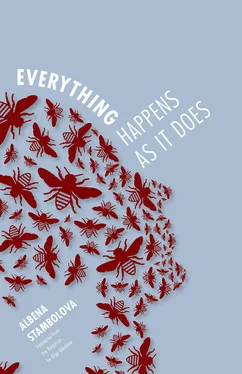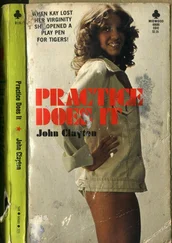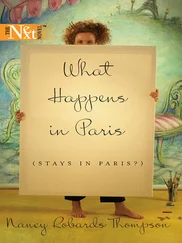And the same as she was doing now, Margarita had then sat on the sand, watching. Or almost… But the same was not the same anymore. For a while she felt imprisoned in some sort of relationship, some connective tissues, like a fly in a spider’s web. That was where her confusion was coming from. She was somehow present in both places at once; she was seeing the same thing separately with each eye. If she blinked, the two images would blend.
Margarita struggled. She did not know what she was struggling against, but it was something and it held her in a kind of cocoon. Valentin was standing about two yards away from her, watching her. What he could see on her face resembled a deep trance, which at first made him worry about the glass in her hand. But she was holding it steadily and seemed to be looking at something beyond the walls of the room. He saw a boy sitting down next to her with the clear intent to start a conversation. The boy even waved his hand in front of her eyes — in vain. Valentin sat down next to the boy on his other side and whispered something to him. The boy turned away from Margarita and burst into laughter.
The candle flames flickered in Margarita’s eyes. She felt nauseated and dizzy. She wanted badly to get to the end of it. This here, and that there. Here and there, now and then. She was suspended between two points in time. How long it would last, she would never know.
Suddenly it was over. Valentin saw her get up, apparently back to her senses. She finished her glass and left it on the grand piano. She came up to him, bent her head and whispered in his ear, This here is different.
At that moment Mr. V. approached and, turning to her, asked if they had already met. “No, no, we haven’t,” Margarita laughed and lifted the lid of the piano. Astonished, Mr. V. watched her sit down on the stool and adjust it to her height. This grand piano had not been opened for years, that was certain. After the first few chords, Mr. V. could tell that the piano was in tune. Maybe because of the cold. Margarita’s fingers strolled easily over the keys, and a few chosen people among the present recognized Shubert. And the CD-player was turned off.
Philip was trying to get Rallie out of the car. Finally she got to her feet, but her head immediately dropped on his shoulder. He propped her up with both arms and led her toward the hospital’s entrance. Rallie walked with her eyes closed, tripping repeatedly. When they entered the brightly lit corridor, she opened her eyes, squinted for a moment, and froze. Brown benches gaped like holes on both sides. Come on, just a few more steps, Philip whispered, but Rallie stiffened her legs and began to slide onto the floor. Philip held her up and managed to pull both of them onto a bench. Not a soul was anywhere to be seen.
Rallie opened her eyes and quickly shut them again. A marble-blue vein on her temple was visibly pulsing. She turned her face toward his neck as if to huddle in him, and he heard her say: No!
What do you mean “no”? You need help.
No! Rallie shouted, making Philip start in his seat.
He thought that someone would appear now, but nothing of the kind happened.
Please, take me out of here, Rallie sobbed.
Philip did not answer and she began to cry like a small child. Her weeping swelled like some new natural force — it was like nothing he had seen before. Rallie sobbed and hudded into him as if it were the end of the world. Worse still, as if the world had vanished and nothing remained except this weeping little girl who had peed her pants.
Philip felt the sobs rise in his own throat and covered Rallie’s head with his hand, pulling her against his shoulder as if trying to hide her. Or to hide himself. He had never been so close to another person.
You’re not allowed to sit here, a voice in a white uniform said by his side.
The voice shook him out of the dream he had sunk into together with Rallie.
We’ll leave.
Philip lifted the now sleeping girl, took her in his arms, and carried her to the car. He was no longer scared of the substances she had taken, whatever they were.
When he parked in front of his apartment building, he saw that the lights in his place were lit. He locked the car on his side, opened the passenger door and lifted Rallie again. No one saw them.
He put her on his bed, took off both their shoes, made a little tent out of blankets, and wrapped his arms around her. Rallie’s breath became regular and soon Philip fell asleep.
Early the next morning, Maria left the house wrapped down to her knees in a black woolen scarf. The baby was still asleep in its basket, and in any case, there was someone to take care of him when he woke up. The old man and the old woman were already awake and moving about, the fire was lit.
Fine snowflakes descended through the air. Maria’s car lay dormant under a thick layer of snow, but she never even glanced at it. She walked through the flurry of stars, and her shape soon melted into the whiteness.
She marched up the hill, toward the chapel where Boris had been baptized that hot summer the neighbor’s boy had died. Her padded suede boots sank in the snow. The old couple had not tried to talk her out of it; they knew they couldn’t. Climbing through the heavy snow was not for everyone, but if Maria had decided to do it, she would, no matter what.
She entered the white forest, the wintry silence. Her feet sank almost to her knees. She soon found out, however, how to exert the least possible effort and started moving much faster. She simply had to lift her knees to her chest as if wading through water. She walked quickly, in tiny steps, like a little black crow hopping in the snow.
A strange narrow path unwound behind her and the snow was beginning to cover it again. It looked intimate and personal, of no use to anyone else.
Having found her rhythm, Maria advanced with the lightness of a bird. The distance grew behind her and she started to laugh. First she smiled, not the eerie smile that made everyone suddenly chilly and silent. Her smile was real, showing a nice row of little white teeth, a child’s smile. She walked and smiled, walked and laughed, until she heard her own voice ringing, a sound foreign to her, the voice of Maria walking through the snow. A voice meant for no one. A voice that had nothing to do with the commanding intonations Mr. V. had heard. When she remembered Mr. V. she laughed even louder. She had never met anyone so sweet and funny. He was a man from a family with a history. Or simply a family man. The word “family” made her laugh even more.
What would Mr. V. do without his family history?
As a matter of principle Maria did not permit herself such thoughts. No analyses of any kind. A snapshot was sufficient for her. Analysis made one weak. It interfered with one’s goals. People who believed they achieved anything by analyzing the situation deluded themselves. They never achieved what they wanted, instead achieving something else. Who knows what exactly, something they would describe with arbitrary words. Most often, words that simply come to mind. Laughter swept through the white forest, accompanying Maria along the way.
Usually things happen very quickly, just like that. What people fail to understand is that things have already happened. Their senses are only sharp enough to put them on the alert. Those more sensitive can perceive that something or other is beginning. Then they believe themselves clear-sighted and quick because they have been able to see a beginning, or whatever word they choose for it, and they start to think. Laughter rang through the forest, scattering through the snow.
Other people needed to think. Maria simply knew things. Thinking made the years of one’s life feel like a burden. But Maria was hopping lightly; her breath came out in laughs, carrying her forward.
Читать дальше











